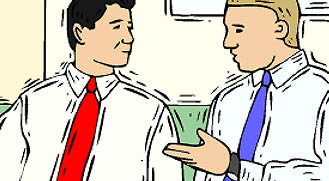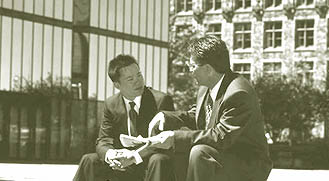Traits of a good mentoree The effective mentoree must possess certain traits. These are further developed as the relationship grows and deepens. 1. The mentoree must be honest with himself. Effective mentoring must be based on reality. To me, two of the most important words in life are "current reality." That means being committed to things as they are, not as we wish they were. We may want them to be different and be willing to work to make them different, but for the present we have to deal with things as they are. I am particularly sensitive to what the psychologists call "transference." The mentoree must own the situation before he can correct it or develop it. Recently I stopped working with a young man because he had been dishonest about his financial situation. He admitted he was in debt but said that it was his wife's fault, which he couldn't control. A prominent psychiatrist once told me that America's second greatest sin, after refusing to delay gratification, is transference, at the heart of so much of the victim syndrome. Those who feel they are victims generally expect more than they are due. I applaud the individual who is handicapped in some way (mentally, socially, physically) but has accepted it as a challenge and no longer sees himself as a victim but as a victor. It's easy to work a little harder and a little longer with people who think that way. At a men's conference in Fresno I met an exceptional man who was severely disabled. I will never forget his statement to me: "My body may be crippled, but I'm not." As my body deteriorates I often think back to his remark. Or, the young man that I met at the Crystal Cathedral. I watched him painfully pull himself on crutches down to the second row. His bright face caught me immediately. Afterwards when we met he said, "Mr. Smith, I have a handicap, but the handicap doesn't have me." That is victorious reality thinking. An executive I've admired for years had an eye put out when he was a small boy. When he entered an Ivy League school, he checked the records and found that no one had ever made straight As and four letters in athletics. He did it, with one eye. He later became vice-president of a major corporation. He was a winner, not a victim. 2. A mentoree must be a good student. A truly good student enjoys the growth process as well as the reward. When I became intrigued with golf, I thoroughly enjoyed the practice and the study of the game. Great teachers want to find great students. With my mentor I tried to be a good student. That entailed several things for me: First, I never tried to impress him with my knowledge. I always exposed to him my ignorance. To hide my ignorance from a teacher is as foolish as hiding my sickness from a doctor. A humble person is always conscious of his ignorance more than his knowledge. Dr. Walter Hearn, who was a biochemist at Yale University, surprised me once by saying, "Fred, every night when you go to bed you ought to be more ignorant than you were when you woke up." I took this facetiously until he explained that if I thought of my knowledge as a balloon and every day that balloon increased in size, it would touch more and more ignorance on the periphery. Therefore my knowledge brought me into contact with my greater ignorance. The arrogant are proud of their knowledge; the humble are acquainted with their ignorance. I have learned to become friends with my ignorance. A good student never tries to "use" his mentor. A person with a well-known mentor can be tempted to refer to him in ways that really use him, particularly in quoting him out of context. The mentor is for progress, not ego satisfaction. On a few occasions I have been abused by someone claiming me as his mentor when there was no relationship. A good student works to ask the right questions. Right questions come from thought, analysis, and discernment. He never asks an idle or careless question. It is demeaning to the mentor. There is power in a good question. Recently a young professor told me how following an awards program he asked a prominent man two questions, and the man concentrated on answering only those two questions to the disregard of all those trying to shake hands with him. I have found writing out my questions beforehand helpful in minimizing the verbiage. A good student does his homework. In dealing with my two mentors, I never called them unless I had written down on paper what I wanted to talk to them about. When we met, I had organized my questions; I knew it was not a social situation. If later we wanted to spend some social time together, that would be up to them, not me. In fact, I never walked into their office and sat down until I was invited to sit down. They had to know I was not going to waste their time. The art of being a good mentoree takes practice and focus. High achievers understand and appreciate the cost of growth. They don't take lightly the responsibility of being a mentoree.
Traits of a good mentoree
Fred Smith writes on two traits that good mentorees have in common.
By Fred Smith


